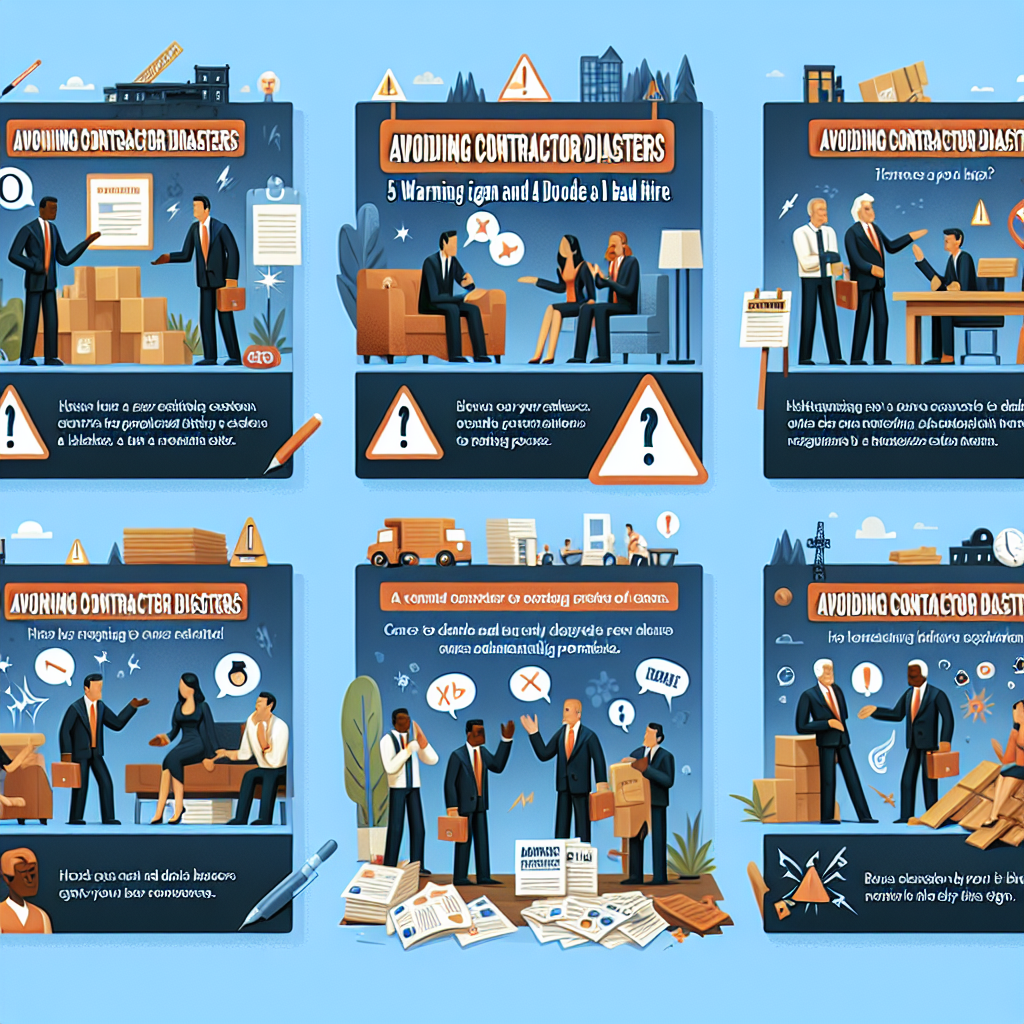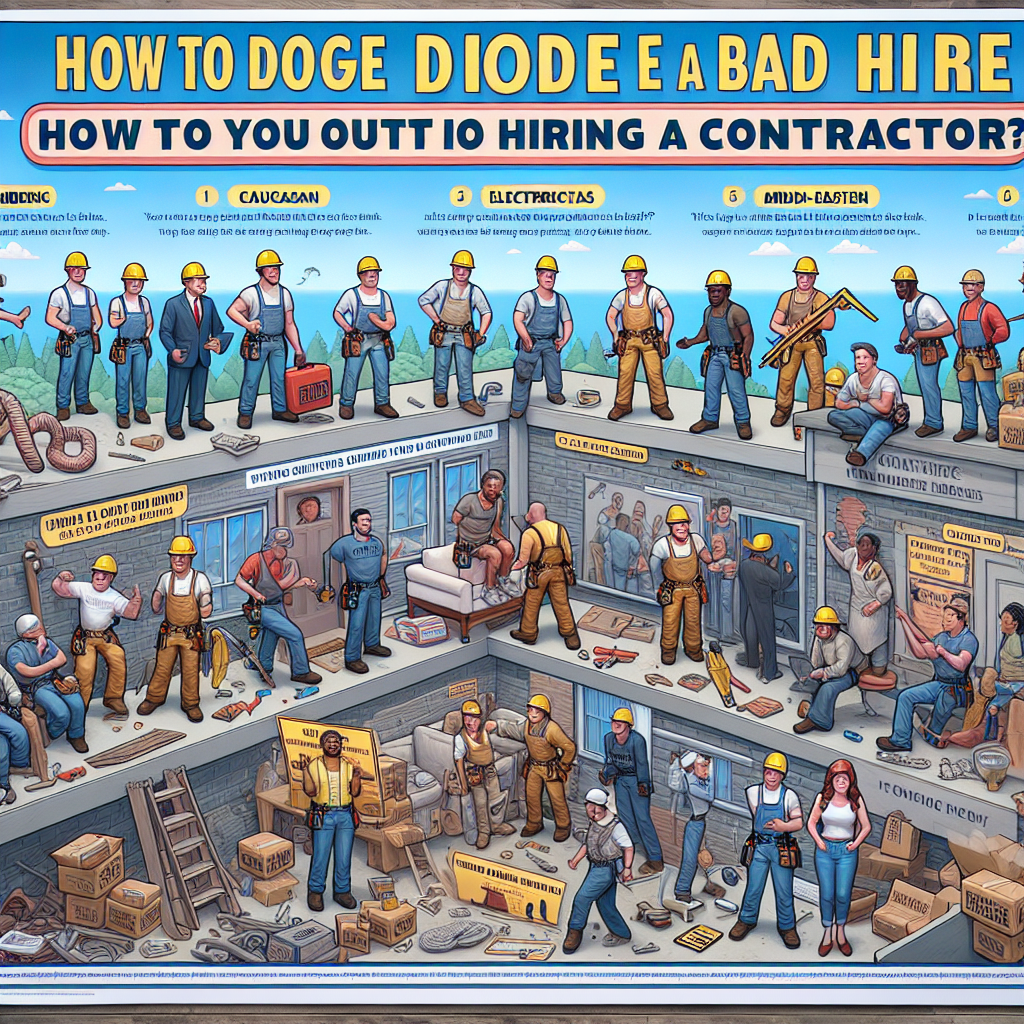-
Table of Contents
- Avoiding Contractor Disasters: 5 Warning Signs and How to Dodge a Bad Hire
- 1. Lack of Proper Licensing and Insurance
- Why Licensing and Insurance Matter
- Red Flags to Watch For
- Case Study: The Unlicensed Contractor
- 2. Poor Communication Skills
- Signs of Poor Communication
- How to Test Communication Skills
- Example: The Silent Contractor
- 3. Unclear or Vague Contracts
- What to Look for in a Contract
- Red Flags in Contracts
- Case Study: The Vague Contract
- 4. Negative Reviews and References
- How to Research a Contractor
- Red Flags in Reviews and References
- Example: The Poorly Reviewed Contractor
- 5. Unprofessional Behavior
- Signs of Unprofessional Behavior
- How to Assess Professionalism
- Case Study: The Unprofessional Contractor
- How to Dodge a Bad Hire
- 1. Do Your Research
- 2. Conduct Interviews
- 3. Request Detailed Estimates
- 4. Review Contracts Carefully
- 5. Trust Your Instincts
- Conclusion
Avoiding Contractor Disasters: 5 Warning Signs and How to Dodge a Bad Hire

Hiring a contractor can be a daunting task, especially when the stakes are high. Whether you’re planning a home renovation, a new construction project, or any other significant undertaking, the right contractor can make all the difference. However, a bad hire can lead to delays, subpar work, and even legal troubles. This article will explore five warning signs of a bad contractor and provide actionable tips on how to avoid making a disastrous hire.
1. Lack of Proper Licensing and Insurance
One of the first things you should check when hiring a contractor is their licensing and insurance. A legitimate contractor will have the necessary licenses to operate in your area and will carry adequate insurance to cover any potential damages or accidents.
Why Licensing and Insurance Matter
Licensing ensures that the contractor has met specific industry standards and is qualified to perform the work. Insurance protects you from liability in case of accidents or damages during the project. Without these, you could be left footing the bill for any mishaps.
Red Flags to Watch For
- The contractor is unable or unwilling to provide proof of licensing and insurance.
- The license is expired or not applicable to the type of work you need.
- The insurance coverage is insufficient or non-existent.
Case Study: The Unlicensed Contractor
Consider the case of Jane, who hired a contractor for a kitchen remodel. The contractor claimed to be licensed but couldn’t provide proof. Jane decided to proceed anyway, only to find out later that the contractor’s shoddy work led to a gas leak, causing significant damage and requiring costly repairs. Jane had no legal recourse because the contractor was unlicensed and uninsured.
2. Poor Communication Skills
Effective communication is crucial for any successful project. A contractor who fails to communicate clearly and promptly can lead to misunderstandings, delays, and frustration.
Signs of Poor Communication
- Delayed responses to emails or phone calls.
- Inconsistent or unclear information.
- Failure to provide written estimates or contracts.
How to Test Communication Skills
Before hiring, have a detailed conversation with the contractor about your project. Pay attention to how they respond to your questions and concerns. Are they attentive and clear, or do they seem evasive and rushed?
Example: The Silent Contractor
John hired a contractor for a bathroom renovation. Initially, the contractor seemed responsive, but once the project started, communication dwindled. John was left in the dark about progress and encountered several unexpected delays. The lack of communication led to a project that took twice as long and cost significantly more than anticipated.
3. Unclear or Vague Contracts
A well-drafted contract is essential for setting expectations and protecting both parties. A vague or unclear contract can lead to disputes and unmet expectations.
What to Look for in a Contract
- Detailed scope of work.
- Clear payment terms and schedule.
- Timeline for project completion.
- Warranty and guarantee information.
- Provisions for changes or unforeseen issues.
Red Flags in Contracts
- Missing or vague details about the scope of work.
- Unclear payment terms or large upfront payments.
- No timeline or unrealistic deadlines.
- Lack of warranty or guarantee information.
Case Study: The Vague Contract
Sarah hired a contractor to build a deck. The contract was vague, lacking details about materials, timeline, and payment terms. As the project progressed, Sarah faced numerous issues, including unexpected costs and delays. The lack of a clear contract made it difficult to hold the contractor accountable, resulting in a stressful and costly experience.
4. Negative Reviews and References
In today’s digital age, it’s easier than ever to research a contractor’s reputation. Negative reviews and poor references can be significant warning signs.
How to Research a Contractor
- Check online reviews on platforms like Yelp, Google, and the Better Business Bureau.
- Ask for references and contact previous clients.
- Look for patterns in the feedback, both positive and negative.
Red Flags in Reviews and References
- Consistent complaints about similar issues (e.g., delays, poor workmanship).
- Unwillingness to provide references or evasive answers about past projects.
- Overly positive reviews that seem fake or scripted.
Example: The Poorly Reviewed Contractor
Mike needed a contractor for a home addition. He found one with mixed reviews but decided to give them a chance. Unfortunately, the negative reviews proved accurate. The contractor was unreliable, often missing deadlines and delivering subpar work. Mike regretted not heeding the warnings in the reviews.
5. Unprofessional Behavior
Professionalism is a key indicator of a contractor’s reliability and quality of work. Unprofessional behavior can manifest in various ways, from tardiness to disrespectful communication.
Signs of Unprofessional Behavior
- Frequent tardiness or no-shows.
- Disrespectful or rude communication.
- Lack of proper attire or equipment.
- Disorganized or messy worksite.
How to Assess Professionalism
Observe the contractor’s behavior during initial meetings and site visits. Are they punctual, respectful, and well-prepared? Do they maintain a clean and organized worksite?
Case Study: The Unprofessional Contractor
Emily hired a contractor for a landscaping project. From the start, the contractor was often late and communicated poorly. The worksite was messy, and the crew was unprofessional. The lack of professionalism led to a project that was both stressful and unsatisfactory.
How to Dodge a Bad Hire
Now that we’ve identified the warning signs, let’s discuss how to avoid hiring a bad contractor. By taking proactive steps, you can increase your chances of a successful project.
1. Do Your Research
Thoroughly research potential contractors before making a decision. Check their licensing, insurance, reviews, and references. The more information you gather, the better equipped you’ll be to make an informed choice.
2. Conduct Interviews
Interview multiple contractors to compare their communication skills, professionalism, and approach to your project. Ask detailed questions and pay attention to their responses.
3. Request Detailed Estimates
Obtain detailed estimates from several contractors. Compare the scope of work, materials, timeline, and costs. Be wary of estimates that are significantly lower than others, as they may indicate potential issues.
4. Review Contracts Carefully
Carefully review the contract before signing. Ensure it includes all necessary details, such as the scope of work, payment terms, timeline, and warranty information. Don’t hesitate to ask for clarifications or amendments if needed.
5. Trust Your Instincts
If something feels off during the hiring process, trust your instincts. It’s better to take your time and find the right contractor than to rush into a decision you’ll regret.
Conclusion
Hiring a contractor is a significant decision that requires careful consideration. By being aware of the warning signs and taking proactive steps, you can avoid contractor disasters and ensure a successful project. Remember to check for proper licensing and insurance, assess communication skills, review contracts thoroughly, research reviews and references, and observe professionalism. By following these guidelines, you’ll be well on your way to finding a reliable contractor who can deliver quality work and a stress-free experience.
In summary, avoiding contractor disasters involves:
- Verifying licensing and insurance.
- Ensuring clear and effective communication.
- Reviewing detailed and comprehensive contracts.
- Researching reviews and references.
- Observing professional behavior.
By keeping these key takeaways in mind, you can dodge a bad hire and achieve the successful outcome you desire for your project.








